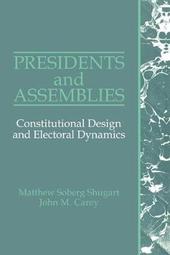
|
Presidents and Assemblies: Constitutional Design and Electoral Dynamics
Paperback / softback
Main Details
| Title |
Presidents and Assemblies: Constitutional Design and Electoral Dynamics
|
| Authors and Contributors |
By (author) Matthew Soberg Shugart
|
|
By (author) John M. Carey
|
| Physical Properties |
| Format:Paperback / softback | | Pages:332 | | Dimensions(mm): Height 234,Width 156 |
|
| ISBN/Barcode |
9780521429900
|
| Classifications | Dewey:320.404 |
|---|
| Audience | | Professional & Vocational | |
|---|
| Illustrations |
18 Tables, unspecified; 14 Line drawings, unspecified
|
|
Publishing Details |
| Publisher |
Cambridge University Press
|
| Imprint |
Cambridge University Press
|
| Publication Date |
28 August 1992 |
| Publication Country |
United Kingdom
|
Description
In recent years renewed attention has been directed to the importance of the role of institutional design in democratic politics. Particular interest has concerned constitutional design and the relative merits of parliamentary versus presidential systems. A virtual consensus has formed around the argument that parliamentary systems are preferable overall to presidential systems, due largely to the loss of power to the executive and assembly in presidential systems. In this book, the authors systematically assess the strengths and weaknesses of various forms of presidential systems, drawing on recent developments in the theoretical literature about institutional design and electoral rules. They develop a typology of democratic regimes that are structured around the separation of powers principle, including two hybrid forms, the premier-presidential and president-parliamentary systems, and they evaluate a number of alternative ways of balancing powers between the branches within these basic frameworks. They also demonstrate that electoral rules are critically important in determining how authority can be exercised within these systems, describing the range of electoral rules that can be instituted and the effects they have on the shape of party systems, on the political agenda, and on the prospects for cooperation between presidents and assemblies.
Author Biography
John M. Carey is John Wentworth Professor in the Social Sciences at Dartmouth College. He has also taught at the Universidad Catolica de Chile, the University of Rochester, Washington University in St Louis, Harvard University, and at the Fundacion Juan March in Madrid, Spain. His interests are comparative politics, elections, and Latin American politics. His research focuses on institutional design and democratic representation. Carey's books include Legislative Voting and Accountability (Cambridge University Press), Executive Decree Authority (with Matthew Shugart, Cambridge University Press), Term Limits in the State Legislatures (with Richard Niemi and Lynda Powell, University of Michigan Press), and Term Limits and Legislative Representation (Cambridge University Press). He has published articles in the American Journal of Political Science, the Journal of Politics, Perspectives on Politics, Comparative Political Studies, Legislative Studies Quarterly, Electoral Studies, Party Politics, Comparative Politics, Latin American Politics and Society, Public Choice, Estudios Publicos, Political y Gobierno, the Revista de Ciencias Politicas, and the Revista Brasileira de Ciencias Sociais, as well as chapters in twenty edited volumes. Data and results from his research are available on his website (http://www.dartmouth.edu/~jcarey/).
Reviews"...an encyclopedic comparative review of the almost infinite range of variations in the elements of national constitutional systems...full of insightful comments and recommendations on the advantages and disadvantages of various features." James L. Sundquist, The Brookings Institution "Shugart and Carey fill a glaring gap. Although I differ with some of their conclusions, I would urge anyone interested in democracy, constitutions, electoral systems, and comparative politics to read this excellent and timely book." Juan Linz, Yale University "Shugart and Carey's Presidents and Assemblies is a major contribution to the debate about what kinds of political institutions will enhance the prospects that new democracies will endure. They challenge the academic orthodoxy that presidential systems constitute a significant obstacle to building stable democracies. Even those who disagree with their argument will find a treasure of useful information. The book is necessary reading for those interested in comparative political institutions and democracy." Scott Mainwaring, University of Notre Dame "...quite comprehensive in its inclusion of many countries and is very thorough and rigorous." British Politics Group Newsletter "...a tremendously useful and thought provoking book. No one who reads it will see the debate over parliamentarism versus presidentialism in the same light again. It contains an impressive amount of detail about political institutions in a remarkably large number of countries. Most important, it takes a serious look at the effects of a number of institutional variations that have not been treated carefully by other analysts, and reaches conclusions that go considerably beyond the classic works on the subject." Barbara Geddes, American Political Science Review "...a sweeping survey of presidential and parliamentary government and of the variants between these polar types... This olume possesses a clarity that makes it a veritable handbook for constitutional draftsmen and for those scholars who watch over their shoulders." Journal of Politics
|